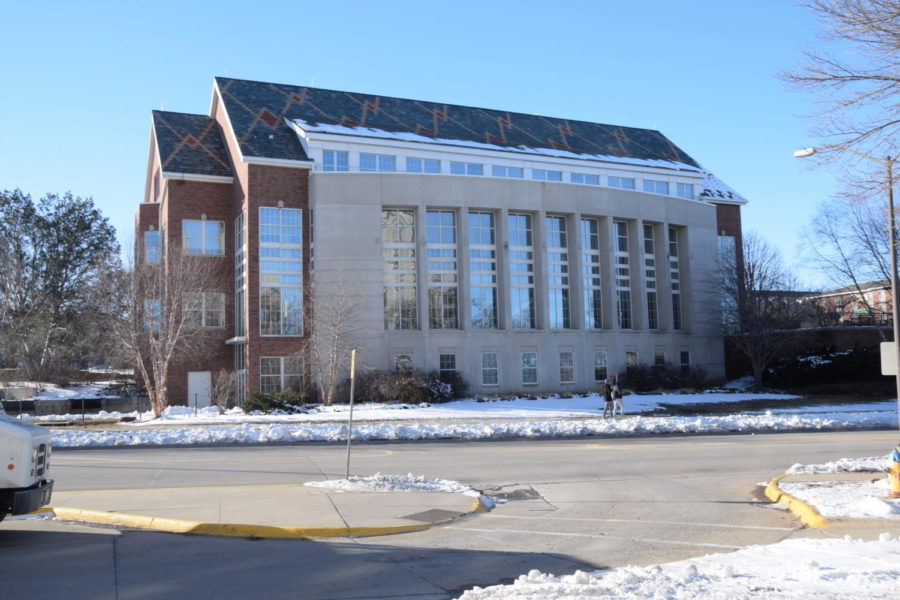New Navigator Unit serves as personalized academic triage
The east face of the Hixon-Lied Student Success Center pictured on a winter day.
Iowa State launched the Academic Success Navigator Unit this semester, which aims to provide students with a personalized approach to connecting them with the campus services they need.
Associate Director of Student Services Adriana Gonzalez said she hopes to reach the students who tend to not take advantage of the university’s services. She said students who are less familiar with the campus may lack the familiarity with campus services that allow others to excel.
There is a perceived expectation that students should come to campus with a good understanding of what services are available and the tools at their disposal, Gonzalez said. She said the Academic Success Navigator Unit is a personalized service for students who do not know where to begin.
Gonzalez compared the navigator unit to a triage unit within a hospital, assessing patients’ needs and assorting them based on those needs. Navigators will fulfill a similar role of assessing students’ needs and getting them connected with the best personnel for their individual challenges.
“It’s not going to be like me telling you, ‘Here’s all of our services,’ Gonzalez said. “It’s literally like, ‘Hey, let’s have a conversation, tell me why you’re here, What are you struggling with?’ We ask all these questions to kind of gauge where the student’s at.”
Gonzalez said through that conversation, the navigator will work to plug the student into services like tutoring groups, supplemental instruction or academic coaching to help solve the problems they are experiencing.
“So I think what my hope is is that there’s no expectation that a student has to know anything,” Gonzalez said. “They just need to show up, and they need to have an open mind; they have be willing to be vulnerable and be willing to ask questions.”
Gonzalez also said navigators will take it one step further than prescribing students various services by taking the initiative with the students. Gonzalez said navigators will not only recommend a service to students, but they will take the time to share with the students what all the service offers and help them get signed up.
“My expectation when I’m training my team is that they’re connecting the student with a person,” Gonzalez said. “They are calling them on the phone and they are making that connection because I feel like the handoff can feel kind of clumsy sometimes, and that’s what I want to avoid.”
Currently, the Academic Success Navigator Unit only has one full-time navigator, Elizabeth Helmick, though Gonzalez said if a greater demand for navigators arises, the academic coaching staff is more than prepared to fill in.
Helmick said with the recent changes in the overall structure of the Academic Success Center, part of her job is explaining the differences between different services and helping students to understand where they might be able to receive the help they’re looking for.
“In my previous sessions, I have been referring [students] to counseling services on campus, the groups, clubs and organizations [and] just other places and partners across the campus too, not just the academic Success Center,” Helmick said.
Helmick said a meeting with a navigator is a great option to address the questions and anxieties students may have with reaching out for academic services in a relaxed informal setting.
“It is really like an ecosystem that students have to navigate and faculty have to navigate,” Helmick said. “For this first semester with this new program especially, it’s really cool to just learn what exactly the students need, and I think talking with as many students as possible is one great insight into understanding what kind of help they need.”
Helmick said that with the students she’s met with so far, one strong theme is outside stressors impacting students’ academic work.
“Maybe they have housing insecurities; they might have financial barriers and then social isolation too,” Helmick said. “Those are the themes that I feel have cropped up, I can’t say if that’s gonna continue, but definitely through my sessions it isn’t just the coursework that students need help with.”
Moving forward, Helmick said she hopes more students utilize the Academic Success Navigator Unit but also that she hopes to really make a difference for the students she meets with. She said she looks forward to seeing how many students follow through on the recommendations from their meetings with her and seeing how that affects their academic standing.
Your donation will support the student journalists of the Iowa State Daily. Your contribution will allow us to purchase equipment, send our student journalists to conferences and off-set their cost of living so they can continue to do best-in-the-nation work at the Iowa State Daily.













